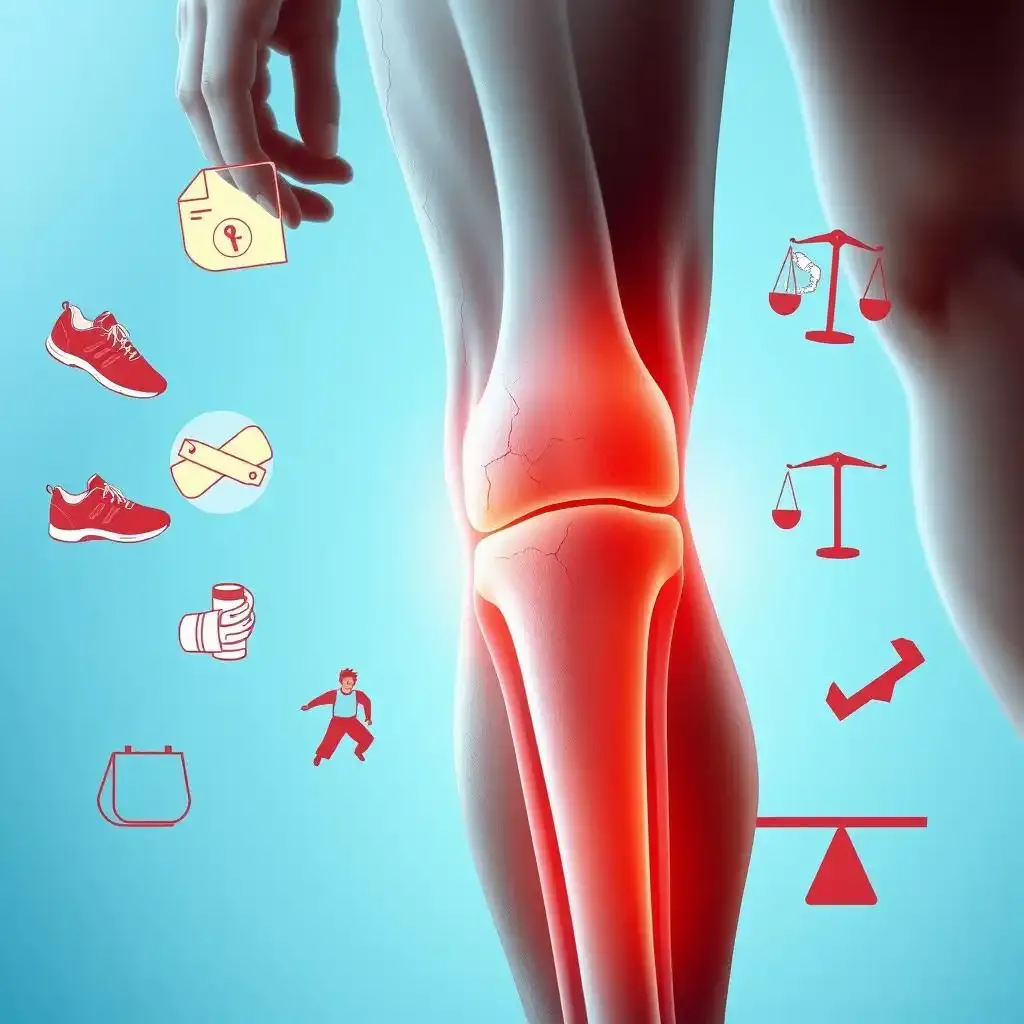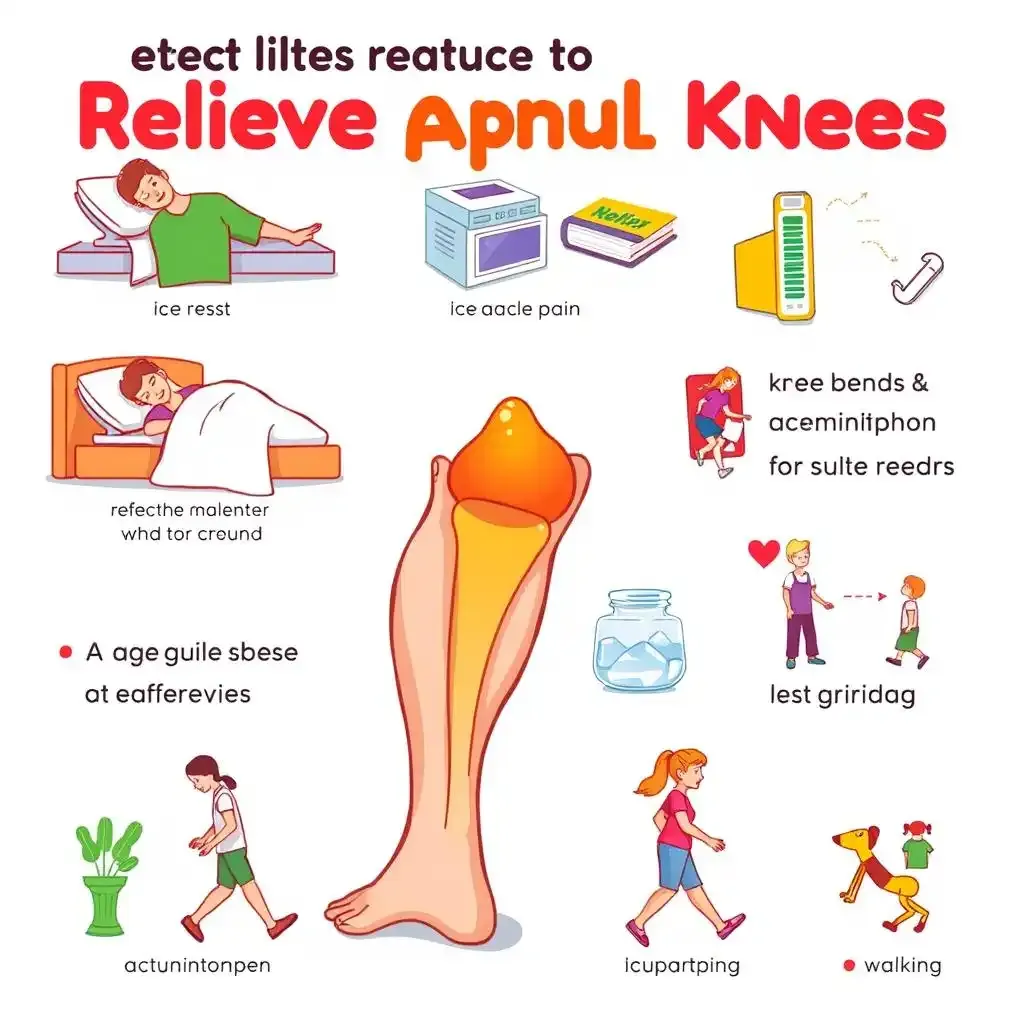Table of Contents
painful knees? You're not alone. Millions struggle with knee pain every day, whether it's a sharp twinge after a long walk or a persistent ache that limits your activity. At kizworld, we understand the frustration and discomfort that painful knees can cause. This article is your guide to understanding the various reasons behind your knee pain, exploring practical relief methods, and learning how to manage your condition for the long term. We'll cover everything from common causes like overuse and injury to effective home remedies and exercises that can significantly ease your discomfort. We'll also address when it’s crucial to seek professional medical help. Get ready to say goodbye to knee pain and hello to a more active, pain-free life. Let's explore the world of painful knees together and find the solutions that work best for you.
Cause of Painful Knees | Symptoms | Treatment Options |
|---|---|---|
Overuse | Pain, swelling, stiffness | Rest, ice, compression, elevation (RICE), over-the-counter pain relievers, physical therapy |
Injury (sprain, strain) | Sudden pain, swelling, bruising, instability | RICE, pain relievers, bracing, physical therapy, possibly surgery |
Arthritis (osteoarthritis, rheumatoid arthritis) | Chronic pain, stiffness, swelling, limited range of motion | Pain relievers, physical therapy, joint injections, surgery, lifestyle modifications |
Gout | Severe pain, swelling, redness, warmth in the joint | Medication to reduce uric acid levels, pain relievers, lifestyle changes |
Bursitis | Pain, swelling, tenderness around the knee joint | Rest, ice, compression, pain relievers, corticosteroid injections |
Meniscus tear | Pain, swelling, clicking or popping in the knee, instability | Physical therapy, surgery (arthroscopy) |
Understanding Painful Knees: Common Causes and When to Worry
Understanding Painful Knees Common Causes And When To Worry
The Usual Suspects: Overuse and Injury
Hey there! Let's talk about painful knees. Think of your knees like super-important hinges – they let you walk, run, jump, and even do silly dances! But, just like any hinge, they can get worn out or damaged. One of the biggest reasons for painful knees is overuse. Imagine bending and straightening a paperclip hundreds of times – it would eventually bend or break, right? Your knees are similar. If you’re constantly on your feet, playing sports, or doing activities that put stress on your knees, you're more likely to have problems. I once knew a dancer who had to stop dancing because of knee pain from years of intense training. It's a classic example of overuse injuries.
Injuries are another common cause of knee pain. A sudden twist, a fall, or a direct blow to the knee can damage ligaments, tendons, or cartilage. It's like accidentally dropping a delicate glass – ouch! Ligaments are strong bands that hold your bones together. Tendons connect muscles to bones. Cartilage is the squishy stuff that cushions your joints. If any of these get hurt, you're gonna have a painful knee. I remember spraining my knee playing soccer once – it was seriously painful!
Cause | What Happens | Example |
|---|---|---|
Overuse | Repeated stress weakens tissues | Running a marathon without proper training |
Injury | Sudden trauma damages tissues | Falling awkwardly and twisting your knee |
Beyond the Basics: Medical Conditions and Other Factors
But wait, there's more! Sometimes, painful knees aren't just about overuse or injuries. Certain medical conditions can also cause knee pain. Arthritis, for instance, is a common problem that makes joints stiff and painful. It's like the hinge is rusty and stiff. There are different types of arthritis, so it's important to see a doctor to figure out what's going on. Another example is something called bursitis, which is when the fluid-filled sacs around your knee joint get inflamed. Imagine tiny water balloons getting swollen – that's uncomfortable!
Your weight also plays a role. Being overweight puts extra pressure on your knees, kind of like carrying a heavy backpack all day. This extra pressure can lead to wear and tear, making your knees ache. Think of it like this: if you load up a wagon with too much stuff, the wheels might start to squeak and eventually break. It’s the same idea with your knees. Even things like how you stand and walk can affect your knees over time. Poor posture can put extra strain on them. So, listen to your body, and don't ignore any pain.
- Arthritis
- Bursitis
- Gout
- Being overweight
- Poor posture
Painful Knees: Effective Relief Strategies and Home Remedies
Painful Knees Effective Relief Strategies And Home Remedies
Rest and Ice: Your Knee's Best Friends
Okay, so your knees are screaming. First things first: give them a break! Think of your knees as hardworking little engines. They've been chugging along, carrying you all over the place. Now they need a rest stop. Avoid activities that make the pain worse. It's like giving your favorite toy a break after a long play session. Next up: ice! Ice is like a superhero for sore knees. It reduces swelling and numbs the pain. Wrap some ice in a towel (don't put it directly on your skin!) and apply it for 15-20 minutes at a time, a few times a day. It's like giving your knees a refreshing cool drink after a long, hot day.
Treatment | How It Helps | Example |
|---|---|---|
Rest | Reduces stress on the knee | Avoid running or jumping for a few days |
Ice | Reduces swelling and pain | Apply an ice pack for 15-20 minutes at a time |
Over-the-Counter Pain Relief: Your Medicine Cabinet Allies
Sometimes, you need a little extra help to tame that knee pain. Over-the-counter pain relievers, like ibuprofen or acetaminophen, can be lifesavers. They work by reducing inflammation and blocking pain signals. Think of them as tiny pain-fighting ninjas sneaking into your knee and taking out the bad guys. Always follow the instructions on the label. Don't overdo it – taking too much medicine isn't a good idea. If you're unsure about which medicine is right for you, talk to your doctor or pharmacist. They're experts in this stuff and can help you choose the right medication and dosage.
- Ibuprofen (Advil, Motrin)
- Acetaminophen (Tylenol)
- Topical creams (like those with menthol or capsaicin)
Simple Exercises: Gentle Movement is Key
Now, before you roll your eyes, hear me out! Gentle exercise is actually super important for your knees. It might seem counterintuitive when your knees are hurting, but it helps to keep them moving and strong. Think of it like this: if you leave a bike in the garage for too long, it'll get rusty and stiff. But if you ride it regularly, it stays in good shape. Start with simple exercises like knee bends or walking. Listen to your body and don't push yourself too hard. If something hurts, stop. You can also try some gentle stretches. If you're not sure what to do, ask a physical therapist. They're like exercise gurus for your joints, and they can help you create a safe and effective exercise plan.
“The key is to find a balance between rest and gentle movement. Too much rest can stiffen your joints, while too much activity can worsen the pain.” - Dr. Anya Sharma, Physical Therapist
Managing Painful Knees: Exercises, Lifestyle Changes, and LongTerm Care
Gentle Movement: Rebuilding Your Knee's Strength
So, your knees are acting up? Don't just sit around feeling sorry for yourself! Gentle movement is key to getting them back in tip-top shape. Think of your knees like old bicycles—if they stay in the garage all winter, they'll get rusty and creaky. But if you take them for a spin regularly, they’ll stay smooth and work well. We're not talking marathons here; we're talking slow, steady progress. Start with simple exercises like walking, short stretches, or gentle knee bends. Imagine your knees are shy puppies – you need to approach them gently and build their trust. I've seen people amazed by how even small changes can make a huge difference. A friend of mine, who used to struggle walking up stairs, started with just five minutes of walking each day, and now she can easily handle a long hike! It's all about consistency. Don't expect miracles overnight; just keep moving.
Exercise | How it helps | Important Note |
|---|---|---|
Walking | Improves blood flow, strengthens muscles | Start with short walks and gradually increase the duration |
Knee bends | Strengthens leg muscles, improves knee stability | Don't bend your knees too far; stop if you feel pain |
Stretching | Increases flexibility, reduces stiffness | Hold each stretch for 15-30 seconds, avoid bouncing |
Lifestyle Tweaks: Small Changes, Big Impact
Your knees aren't just affected by what you do; they're also affected by what you *are*. Maintaining a healthy weight is super important. Excess weight puts extra pressure on your knees, and that pressure equals more pain. I'm talking about that extra pressure like adding extra bricks to a crumbling wall – it's not going to make the wall stronger. Think of your knees as precious cargo—you wouldn't overload a truck with fragile items, would you? Similarly, you need to be mindful of the weight you're putting on your knees. This means eating a balanced diet and getting regular exercise (even if it's just a stroll around the block). Another important aspect is your posture. Slouching puts extra strain on your knees, so stand tall and keep your back straight. It's like having a well-balanced backpack – distributing the weight correctly is crucial for comfortable carrying. Simple changes can make a world of difference!
- Maintain a healthy weight
- Eat a balanced diet
- Maintain good posture
- Wear supportive shoes
- Avoid activities that aggravate your knee pain
Long-Term Strategies: A Plan for Lasting Knee Health
Dealing with painful knees is a marathon, not a sprint. The good news is that with a bit of effort and consistency, you can improve your knee health for the long run. Think of it like training for a big race—you wouldn't expect to win the race without consistent training, right? Similarly, maintaining good knee health requires a long-term commitment. This involves a combination of regular exercise, healthy eating, and managing your weight. It’s also important to listen to your body. If you experience any sharp pain or discomfort, stop what you’re doing and rest. Don't be afraid to ask for help, either. A physical therapist can guide you on exercises and stretches that are specifically designed to strengthen your knees and improve their flexibility. They're like your personal knee coaches! With a solid plan and some persistence, you can keep your knees happy and healthy for years to come. Remember, you’re in this for the long haul, so take care of your knees and they’ll take care of you.
“The best way to manage painful knees is to prevent problems before they start. This involves maintaining a healthy weight, eating a balanced diet, and exercising regularly.” – Dr. Emily Carter, Orthopedic Surgeon
Final Thought
Dealing with painful knees can be challenging, but understanding the causes and employing the right strategies can greatly improve your quality of life. Remember, early intervention and a proactive approach are key. If your knee pain persists or worsens, don't hesitate to seek professional medical attention. With the right knowledge and care, you can steer your trip to healthier, happier knees. Visit kizworld for more helpful information and resources.